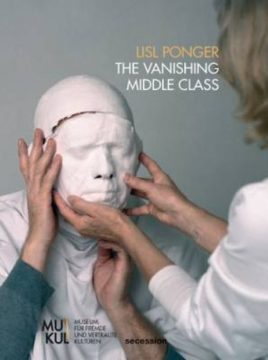For many years Lisl Ponger has been concerned with the construction of (cultural) identity, with the often stereotypical imaginings and perceptions of the Other and the associated issues of pictorial representation. Her art frequently engages with the academic disciplines of ethnology and anthropology, whose methods and politics become manifest in the collection and exhibition practices of ethnographic museums. The Secession is providing the opportunity for her to realise a long-cherished plan – a Museum für fremde und vertraute Kulturen [Museum for Familiar and Foreign Cultures], the MuKul. In this fictitious museum, which in its appearance and presence is a detailed restaging of a museum of ethnology, Ponger not only acts as the curator of the The Vanishing Middle Class exhibition, she is also present as an artist in the special focus exhibition, Lisl Ponger. Wild Places, which features some of her previous work.
In order to take up and examine the disappearance of the middle class in her show, Ponger meticulously researched the structures and presentational conventions of ethnological collections. She also applies this principle of imitation to the conception and design of the exhibition and the accompanying “reader”.
However, among all this detailed precision she engineers a rupture that is particularly enlightening: with the middle class as the subject to be salvaged for future generations, Ponger shifts the focus from “exotic”, non-European cultures to the heart of Western societies. By intelligently employing the device of imitation with a simultaneous shift in content, she shows how hegemonic thought continues to exerts influence on the construction of foreign cultural identities in a way that is unequivocally sensual. With the The Vanishing Middle Class exhibition Ponger provides an extremely interesting analysis of the present state of the middle class. While in Western countries the gap between wealth and poverty is continually widening as a consequence of neoliberal economic policies and their associated speculation, property bubbles and bank crises – thus forcing the centre of society out to the periphery – in the threshold countries, especially China, the small, aspiring middle classes are in the process of renegotiating definitions of democracy, social solidarity and critiques of capitalism.
The articles by US American historian and ethnology critic James Clifford, art historian Yvette Mutumba, currently research curator at the Weltmuseum in Frankfurt am Main, and the Vienna-based artist and author Tim Sharp offer a wide-ranging survey of critical considerations relating to the function and operation of museums of ethnology in general and Lisl Ponger’s MuKul in particular as well as a comprehensive discussion of the history and present state of the so-called middle class.
By treating the Western middle class as an object of study in the same way that, even today, exhibitions make a spectacle out of “exotic” peoples or ethnic groups in remote parts of the non-Western world, Ponger’s show strikingly illustrates how many museums operate; the resulting exercise in deconstruction invites critical engagement with these mechanisms. (Texts: James Clifford, Herwig Kempinger/Jeanette Pacher, Yvette Mutumba, Tim Sharp)
- Veröffentlicht am Mittwoch 18. Dezember 2024 von Revolver Publishing
- ISBN: 9783957630087
- 192 Seiten
- Genre: Hardcover, Kunst, Softcover
